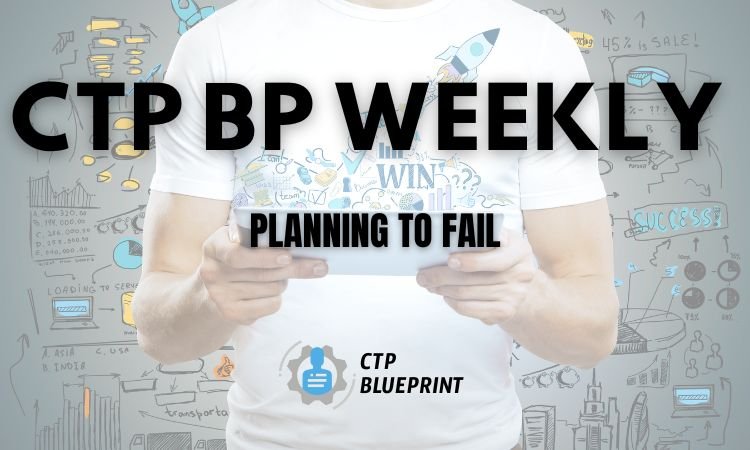Planning to Fail

Hello, awesome people!
Welcome to the CTP Blueprint Weekly!
On the last Weekly I talked about planning! Either professional or even personally, planning ahead or just simply writing down things is important to keep yourself organized and maintain your sanity as good as possible!
Let's continue with the topic by talking about something which for some can be considered some kind of taboo but inevitable: planning to fail.
No matter how in detail you plan, and how many plans you make, eventually, those plans will fail! It may work once or twice but life happens to change and what you planned doesn't work for the current situation.

Entrepreneurship is hard, but it's also fun. The excitement of launching a new project and seeing it come to life can be intoxicating, but the reality is that most projects fail. That's okay!
There are many benefits to failure — it teaches you what works and what doesn't work in your business model while providing valuable information on how consumers respond to the products or services you're offering. This can help inform your next round of experiments or give you clues about why some things didn't work out as planned.
Failure is a great way to learn about your business
It's the best way to learn about your business because it forces you to change, adapt and improve.
Failure can be difficult for some people, but it doesn't have to be painful or difficult at all! In fact, failure can actually lead us down a path of success by showing us what we don't know or how we could improve our processes.
You need to know what kind of information will be meaningful for your business and how to collect it.

It can be collected in a variety of ways: through surveys, interviews with customers or users, focus groups and more. There are many different types of information that can be useful depending on what kind of business you're building. The best way to determine which type of customer feedback will work best depends on the nature of your product or service — and what type(s) of customers might use it.
When you plan, you need to plan for failure
This is not a bad thing! Failure is a part of learning and can be used as an opportunity to learn more about your business and how it runs. When something goes wrong, it's important that we don't brush off the experience as unimportant or meaningless — we have an opportunity here in which we can grow our skillset and improve our company's overall performance.
If there's one thing I've learned so far, it's that planning isn't always enough when things go south; sometimes there will be unexpected obstacles along the way that prevent us from reaching our goals completely on time or at all.

If you want to know what works and what doesn't, a good way to start is by measuring your success
You'll learn a lot from the things that don't work, but you can only see those if you pay attention to the results of your efforts
It’s important to remember that failure isn’t always a bad thing. It can be an opportunity for your business to learn from the mistakes you made and improve on them the next time around. The key is knowing when it is time to move on, so that you don’t keep repeating them again and again.


If you find it valuable and useful please comment below!
Or if you have any other questions, comment below as well!
I might do a post or video about it to help you :)

Like and follow the pages below to get notified about the live webinars!
Thank you so so much for your support!!








Yay! 🤗
Your content has been boosted with Ecency Points, by @elianaicgomes.
Use Ecency daily to boost your growth on platform!
Support Ecency
Vote for new Proposal
Delegate HP and earn more
The plan is to not have a plan.Whatever happens happens.For some having a plan or goal works that is about 60% the other 40% not so much.We all fail.From the time were born to the time we die we can't count the numerous times we fail in our lifetime.That's my 2 cents
I have that mentality most of the time but with all the things I have and want to do..I have to plan something even if I only do a small portion of it..which is most of the time 🤣
As long as there's some growth with out failures, plan or no plan, whatever works for you 😁
!CTP
Yes, we always need a backup, contingency, or something along those lines. If you don't fail it means you're not doing anything. In school we are conditioned to believe that failure is a bad thing. Not always by our teachers. Noone really likes failure but it's necessary to embrace it, learn the lessons and move on.
@elianaicgomes
!CTP
!PIZZA
That's so true. Up to the parents to educate their kids the best way they can, especially when it comes to failure.
I don't want my kid coming back from school afraid of my reaction if he fails something. Instead I will help him try again and do better next time!
At least, that's what I've been slowly teaching him and hopefully it goes well for him in the future :)
!CTP
That is awesome, Eliana. David is going to have a great future! 😀
!ALIVE
!CTP
@elianaicgomes! You Are Alive so I just staked 0.1 $ALIVE to your account on behalf of @lisamgentile1961. (8/10)
The tip has been paid for by the We Are Alive Tribe through the earnings on @alive.chat, feel free to swing by our daily chat any time you want.

Good Morning and Thank you, @youarealive! Enjoy your day.😀
PIZZA Holders sent $PIZZA tips in this post's comments:
@lisamgentile1961(1/5) tipped @elianaicgomes (x1)
Please vote for pizza.witness!
Thanks for the information. Planning is crucial to success.
Great post Eliana. Arnie says the difference between success and failure is that after we fail, we need to get back up again.
That's the part most don't follow...they give up and stay on the ground blaming everything and anything or martyring themselves why and how they failed.
They simple give up when getting back up should be part of the plan!
I'm glad that some of us are following the right plan ;)
!CTP